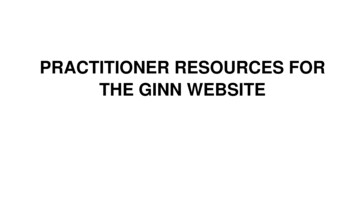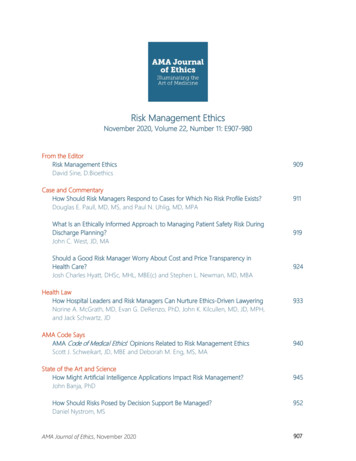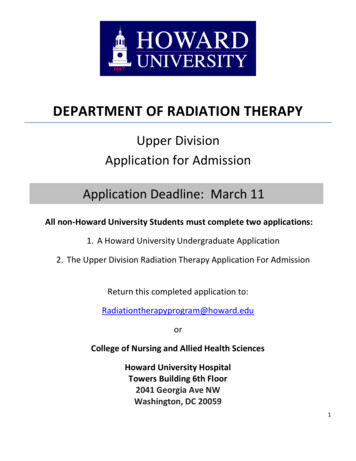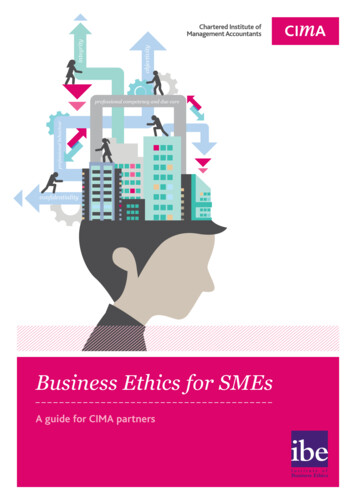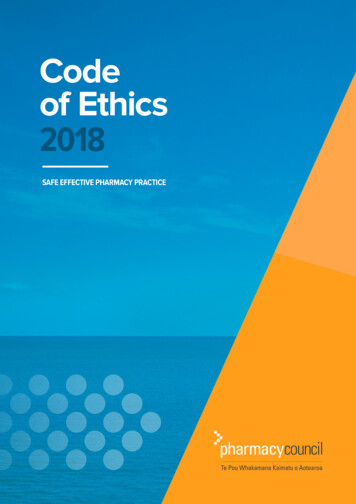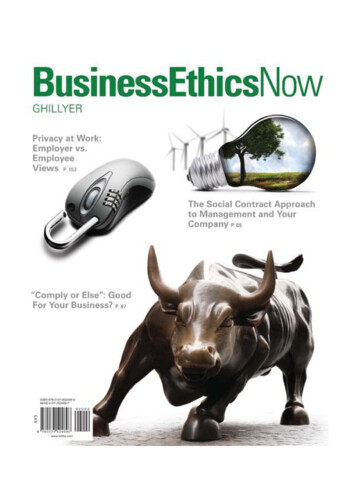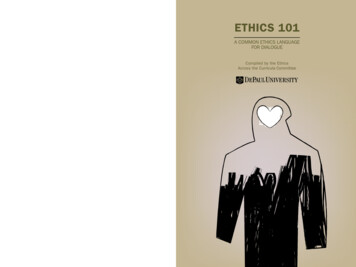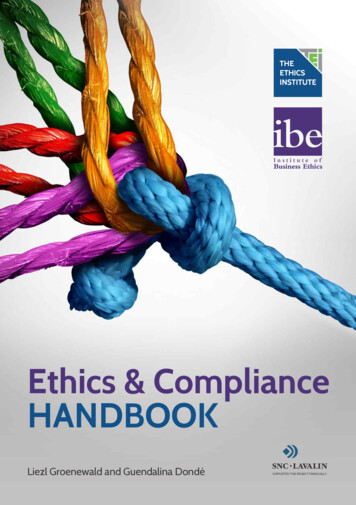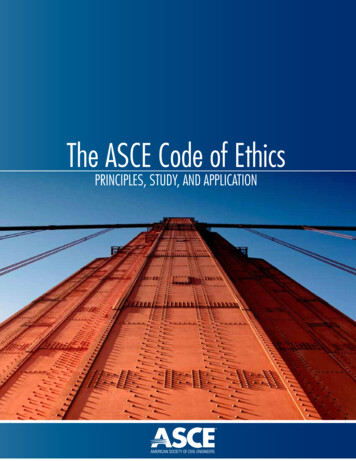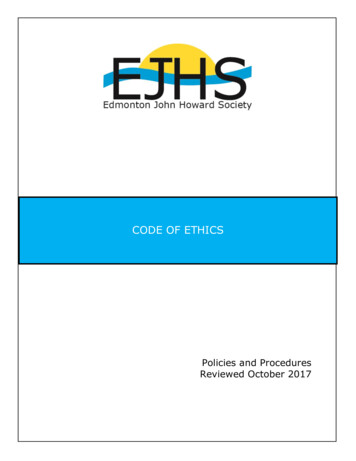
Transcription
CODE OF ETHICSPolicies and ProceduresReviewed October 2017
Table of Contents1.0Introduction1.1 Purpose and Structure1.2 Definitions1.3 Preamble1.4 Accountability2.0Agency Declaration2.1 Corporate/Business/Marketing/Contractual2.2 Human Resources3.0Allegations of Violations4.0Employee DeclarationCommentary1.0Primary Professional Obligation2.0Integrity3.0Competence and Quality of Service4.0Acting Conscientiously5.0Agency Employee / Client Relationship6.0Confidential Information7.0Outside Interests and Agency Work8.0Responsibility to the Workplace9.0Responsibility to the Profession10.0Responsibility to Society11.0Responsibility to ColleaguesReviewed/Updated:July 2016Sept 2016October 2017
Policy Type:Code of EthicsPolicy Title:Agency Declaration1.1Policy Number:2.0Last Updated:April 2015Creation Date:1995Purpose and StructureEdmonton John Howard Society is a non-profit, community-based crime preventionAgency. Operating in Edmonton since 1949, our programs and services provideassistance to people who are in conflict with the law, their families, those who have thepotential to be in conflict with the law, or those who have been victims of crime. Wework with young people as well as adult men and women. To build our vision of safetyand harmony in our community, we work with people to eradicate the root causes ofcrime.Edmonton John Howard Society employees are engaged in implementing, evaluatingand providing services and programs that affect individuals, families, social groups,organizations and communities. Therefore, the basic principles of ethical conduct arenecessarily broad. The purpose of a detailed Code of Ethics, outlining the professionalattributes and conduct expected of the Agency employee, is to provide a practicalguide for professional behaviour and the maintenance of a reasonable standard ofpractice within a given cultural context.The preamble identifies the philosophy behind the need for a Code of Ethics. TheDeclaration sets out ethical boundaries expected of the Agency employee regardlessof education, experience and background. The Commentary is a detailed statement ofthe standard of practice expected from the Agency employee. The Code of Ethics ispresented with full knowledge that specific conduct will be further guided byprofessional judgments and situational circumstances. However, in all instancesemployees are expected to practice competently and to refrain from conductunbecoming to a professional.1.2DefinitionsClient: The person(s) on whose behalf an Agency employee provides or undertakes toprovide professional services.Conduct Unbecoming: Behaviour or conduct that does not meet the standard of carerequired and is subject to discipline.Conflict of Interest: A conflict of interest occurs in a situation where an employee’saffiliation with an organization, group, individual or client appears to becompromised due to another affiliation, actual or potential interest that mayinfluence or appear to influence the conduct of the employee’s official duties.Conflicts may arise when or if an employee has a relationship of interest thatcould be interpreted as improperly influencing their professional judgment orability to act in the client’s best interest. A conflict of interest may exist whether ornot the employee benefits from the situation if it raises significant concern aboutthe employee’s objectivity.Employee: An individual who is duly authorized as a paid employee, volunteer, boardmember or student, to provide programs and services made available by
Policy Type:Code of EthicsPolicy Title:Agency DeclarationPolicy Number:2.0Last Updated:April 2015Creation Date:1995Edmonton John Howard Society.Malpractice and negligence: Behaviour included in “conduct unbecoming,”malpractice and negligence, relates to behaviour within the parameters of theprofessional relationship that falls below the standard of practice and results in aninjury to a client. It includes behaviour resulting in assault, deceit, fraudulentmisrepresentations, defamation of character, breach of contract, violation ofhuman rights, malicious prosecution, false imprisonment or criminal conviction.Person: Includes individuals, families, social groups, public and private organizations,associations and recognized community entities.Regulatory Body: The body charged under the laws of a particular jurisdiction with theduty of governing the Agency or the body voluntarily recognized on a particularjurisdiction by the Agency as having the duty to govern the Agency.Standard of Practice: The standard of care ordinarily expected of a competent Agencyemployee. The public can be assured that an employee has the training, talentand the diligence to provide individuals with professional services.1.3PreambleWe believe1.4 that every individual has intrinsic worth and has the right to be treated withdignity and respect. in the potential of all human beings and their capacity for growth and change. that all individuals have the right to live in a safe and peaceful society and thatjustice is best served through measures that resolve conflict and restore harmony. that individuals are responsible for their own actions and must be heldaccountable for those actions. that the root causes of crime are found within communities and that the solutions tocrime are also found in communities. in serving community needs by cooperating and collaborating to achieve ahealthy and safe society.Accountability Employees are accountable to the people they serve, to their profession and tosociety. This accountability is achieved by adherence to the philosophy, purposeand standard of practice determined by the Agency. Failure to fulfill the obligation of this Edmonton John Howard Society Code of Ethicsmay result in disciplinary procedures up to and including termination ofemployment and appropriate consequences under recognized regulatory body(where applicable).
Policy Type:Code of EthicsPolicy Title:Agency Declaration2.12.0Last Updated:April 2015Creation Date:1995Corporate/Business/Marketing/Contractual The Code of Ethics applies at all times, without exception, to all Agency employees,students and volunteers. The Agency’s Mission and Core Values guide all attitudesand actions in our business decision making. The Agencies Corporate responsibilities are conducted in an ethical, positive workenvironment. Corporate responsibilities include:ooo2.2Policy Number:BusinessMarketingContractual Relationships The Agency will be appropriately licensed to provide services for which it iscontracted and will carry appropriate levels of general liability insurance. Funds fromprogram contracts will only be used for the purposes of the specific, fundedprograms. The Agency ensures that it always provides true and accurate informationin all presentations and materials provided to the public and will in no way willfullymislead the recipients of such information. Following these standard ethical practices strengthens the relationships andconfidence of all our stakeholders and partners. Contractual signing authority is heldby Directors only.Human Resources Edmonton John Howard Society is an equal opportunity employer and does notdiscriminate in its hiring practices. Employee files are confidential and access tothem is limited to the individual and their Supervisory personnel and any otherpersons who have obtained the employee’s consent. Other access is only permittedby applicable law and regulation.
Policy Type:Code of EthicsPolicy Title:Allegations of ViolationsPolicy Number:3.0Last Updated:July 2016Creation Date:1995 Edmonton John Howard Society (the Agency) has established and implemented policiesand procedures that enable individuals to come forward with information on illegal practicesor violations of Agency policies. This policy specifies that the Agency will not retaliateagainst and will protect the confidentiality of the individuals who make good-faith reports. Individuals that come forward must know that their concerns are being taken seriously andbeing addressed in a timely manner. If malicious allegations are made and proven to be malicious, the Agency will takeappropriate corrective action.See Edmonton John Howard Society Personnel Policy and Procedures 11.0 AnonymousSubmission for more information. To report an allegation of the Code of Ethics and the Agency response to the allegation referto the Edmonton John Howard Society Personnel Policy Sections 10 and 11 Grievancesand Anonymous Submissions
Policy Type:Code of EthicsPolicy Title:Employee DeclarationPolicy Number:4.0Last Updated:October 2017Creation Date:1995As a member and/or employee of Edmonton John Howard Society, I commit myself tofulfill to the best of my ability the following obligations:1. I will regard the wellbeing of the persons I serve as my primary professional obligation.2. I will fulfill my obligations and responsibilities with integrity.3. I will be competent in the performance of the services and functions I undertake onbehalf of the persons I serve.4. I will act in a conscientious, diligent and efficient manner.5. I will respect the intrinsic worth of persons I serve in my professional relationshipswith them.6. I will protect the confidentiality of all professionally acquired information. I will disclosesuch information only when properly authorized or when obligated legally orprofessionally to do so.7. I will ensure that outside interests do not jeopardize my professional judgment,independence or competence.8. I will work for the creation and maintenance of workplace conditions and policies thatare consistent with the standard of practice set by this code.9. I will act to promote excellence in the promotion of Edmonton John Howard Society.10. I will act to effect social change for the overall benefit of humanity.11. I will treat fellow colleagues in the same accepting, understanding manner in which Itreat our clients
Policy Type:Code of EthicsPolicy Title:1.0 Primary ProfessionalObligationPolicy Number:CommentaryLast Updated:April 2015Creation Date:1995I will regard the wellbeing of the persons I serve as my primary professional obligation.1.1This declaration is fundamental and self-explanatory. All subsequent declarations areintended to aid the employee in maintaining a reasonable standard of practice.1.2The employee will be able to apply the practice values of acceptance, selfdetermination and individuality without discrimination on grounds of race, ethnicity,language, religion, marital status, gender, sexual orientation, age, abilities,socioeconomic status, political affiliation or national ancestry.1.3Client (persons served) shall mean the individuals, families, social groups,organizations and communities that have agreements (written or unwritten) with theemployee for the purpose of trying to achieve a specified outcome.
Policy Type:Code of EthicsPolicy Title:2.0 IntegrityPolicy Number:CommentaryLast Updated:July 2016Creation Date:1995I will fulfill my obligations and responsibilities with integrity.2.1The employee will possess reasonable moral principles especially in relation totruth and fair dealing and have personal qualities of honesty and sincerity.2.2Integrity is the foundation of our practice and therefore underlies each ethical declaration.2.3The employee will identify and describe education, training, experience, professionalaffiliations, competence, nature of service, and actions in an honest and accuratemanner.2.3.1 Educational degrees/diplomas/certificates, etc., will be cited only when theyhave been received from an accredited institution of higher education.2.3.2 The employee will not make a false, misleading or exaggerated claim ofefficacy regarding past or anticipated achievement with respect to clients,scholarly pursuits or contributions to society.2.3.3 The employee will take reasonable care to distinguish between publicstatements and actions made as a private citizen and as a representative ofthe Agency.2.4If a conflict arises in professional practice, the standards declared in this Code takeprecedence. Conflicts of interest may occur because of demands from the generalpublic, workplace, organizations or clients. In all cases, if the declarations of this Codewould be compromised, the employee must act in a manner consistent with thestandard of practice set by this Code.2.5The employee is expected to observe the declarations of this Code in spirit as well asto the letter. Therefore, it is expected that an Agency employee will immediately reportto their direct Supervisor any criminal charges they may incur or risk termination. Theemployee will also report any violation of the Code itself.2.6The employee’s private life is a personal matter to the same degree as any othercitizen except when it may compromise the fulfillment of professional responsibilities, orreduce the public trust in our organization.
Policy Type:Code of EthicsPolicy Title:3.0 Competence and Qualityof ServicePolicy Number:CommentaryLast Updated:September 2016Creation Date:1995I will be competent in the performance of the services and functions I undertake on behalfof the persons I serve.3.1Competence goes beyond formal qualifications. The employee will make reasonableand continuous efforts to upgrade and use effectively the values, knowledge and skillsof professional practice.3.2The employee will not undertake a matter of professional practice unless there is anhonest belief in that employee’s competence to handle it. If sufficient ability cannot beattained without undue delay, risk or expense to the client, the employee should eitherdecline to act or obtain the client’s consent to consult or collaborate with, or refer to, anemployee or other professional who is competent on that matter.3.3The above is not to be construed to mean that an employee, when lacking specializedability, will decline to make a reasonable response to a request for help or to workcooperatively with others when there is no one with the required competence availableto those requesting the help.3.4The employee will recognize that sufficient ability for a particular task may require advicefrom or collaboration with (experts in) other professional disciplines and will seek clientagreement to work in these collaborative situations. In the event that the client refuses toconsult with another professional (expert), the employee we will seek consultation onbehalf of the client ensuring the clients anonymity. The employee will follow the advice ofthe consulting professional (expert) while supporting the client.3.5The employee will recognize that personal problems and conflicts may interfere withprofessional effectiveness. Reasonable health and wellbeing will be maintained by theemployee as a recognized component of competent practice. If personal problemsoccur, reasonable care will be taken by the Agency employee to determine whetherprofessional activities should be suspended, terminated or limited.3.6The employee will provide a quality of service that is at least equal to the standard ofpractice one would expect to receive in a like situation.3.7The employee will have adequate knowledge and abilities to meet standardof practice requirements.3.7.1 Ability to use interpersonal interviewing skills to provide clear explanations ofprofessional and workplace roles; to establish the expectation of mutualparticipation in the change process; to clarify the need to gather sufficient andappropriate information for understanding and assessment; to determinecompetence to consent; to implement the requirement of informed consent; todetermine what must be disclosed to clients with respect to assessments, thenature of the helping process, alternative modes of intervention and innovativeintervention possibilities.3.7.2 Ability to facilitate termination of services or referral to others in an orderlymanner with a minimum amount of expense and other inconvenience to the
Policy Type:Code of EthicsPolicy Title:3.0 Competence and Qualityof ServicePolicy Number:CommentaryLast Updated:September 2016Creation Date:1995client.3.7.3 Ability to keep clients informed of all relevant commitments and possibleimplications of their situation.3.7.4 Ability to notify a client within a reasonable interval when unable to meet arequest.3.7.5 Ability to make a prompt and reasonable report when required.3.7.6 Ability to keep appointments with clients and answer all verbaland written communications within a reasonable time.3.7.7 Ability to arrange adequate coverage of work in times of absence.3.7.8 Ability to constructively contribute to the retention of support staff and to themaintenance of workplace facilities.3.7.9 Ability to respond reasonably to client dissatisfaction, early and directly.3.7.10 Ability to use consultation and supervision in the management of theprofessional relationship and the application of practice methods.
Policy Type:Code of EthicsPolicy Title:4.0 Acting ConscientiouslyPolicy Number:CommentaryLast Updated:April 2015Creation Date:1995I will act in a conscientious, diligent and efficient manner.4.1The employee will do their work thoroughly in accordance to one’s professionalobligation of what is right and principled.4.2The employee will do their work carefully, persistently, and attentively with a constanteffort.4.3The employee will do their work in a well-organized and competent way, performingtheir tasks in the best possible and timely manner.
Policy Type:Code of EthicsPolicy Title:5.0 Agency Employee / ClientRelationshipPolicy Number:CommentaryLast Updated:April 2015Creation Date:1995I will respect the intrinsic worth of persons I serve in my professional relationships withthem. I will set and maintain professional boundaries with all clients served and use thefollowing as a guide to creating and maintaining a professional client/workerrelationship.5.1An employee will not enter into a personal relationship of any kind with any client,who has received services by any program in the Agency, for a minimum of two(2) years after the client has stopped receiving services from the Agency. Theemployee shall not:5.1.1 Engage in sexual or romantic relations with the client;5.1.2 Enter into a personal friendship with the client, including through socialmedia; or5.1.3 Enter into a financial relationship with the client, such as a businesspartnership, employer/employee relationship, contractual relationship, orany other financial transaction.5.2All employees will address conflict of interests in the following manner;5.2.1 An employee will be aware of the circumstances that may lead to, or beperceived as, a conflict of interest and will make reasonable effort to avoidsuch conflict. If the conflict of interest cannot be avoided, employees mustdisclose the conflict to their immediate Supervisor, and take measures tominimize the impact of the conflict on clients, coworkers and employers.5.2.2 When an employee’s professional responsibilities to the Agency and to aclient are in conflict, employees will attempt to safeguard client rights andpromote changes by bringing the situation to the attention of their directSupervisor and attempting to facilitate a satisfactory resolution of theconflict.5.2.3 An employee who intends to provide or provides professional servicesthrough more than one organization will advise each organization of anypotential conflict of interest.5.3An employee will not in any manner encourage or ask a client of a co-worker tosolicit business on behalf of an employee. This includes personal fundraising andthe sale of any products, whether personal or professional.5.4Employees are not permitted to exchange gifts, personal property and money, orreceive gratuities from clients served. Doing so destroys the essence of theclient/worker relationship. If a client presents an employee with a gift of any sort,the employee shall thank the client and politely explain the policy in place for allAgency employees to follow. The employee must then report this information totheir direct Supervisor immediately.5.4.1 A small token gift, such as a box of chocolates, may be accepted on behalfof the Agency. If in doubt that the gift is token, the employee must consult
Policy Type:Code of EthicsPolicy Title:5.0 Agency Employee / ClientRelationshipPolicy Number:CommentaryLast Updated:April 2015Creation Date:1995his or her direct Supervisor. If any gift is accepted, the direct Supervisormust be notified and the gift documented in the client file.5.5All employees will maintain professional boundaries by not disclosing anypersonal information to clients such as telephone numbers, home addresses,family members’ names, or by providing client transportation without permissionfrom a direct Supervisor and meeting other Agency requirements (e.g. approvedinsurance).5.6The employee will respect the intrinsic worth of clients and act to ensure throughreasonable advocacy and other intervention activities that dignity, individualityand rights of persons are safeguarded.5.7The employee will be trustworthy and possess the necessary values todemonstrate primary respect for the intrinsic worth of individuals.5.8The central focus of practice, within a professional relationship, will be based onvoluntary (and under some circumstances, involuntary) mutual agreementsbetween the employee and client. The employee will maintain a reasonable levelof objective self-awareness in order to appropriately manage personal needs,feelings, values and limitations in the context of a professional relationship, theplanned changed process and the intended outcomes.5.9The employee will respect client motivation, capacity and opportunity for changeat all times during the planned change process and use this knowledgeappropriately to facilitate the attainment of intended outcomes.5.10The employee’s professional relationship with voluntary and involuntary clientswill be developed on the principle of mutuality. This means that the helpingprocess will involve shared responsibilities between the client and the employeetoward the achievement of agreed upon goals. In the case of the involuntaryclient, mutual agreements may not exist at the outset of the relationship but theemployee’s reasonable adherence to this principle is expected. Where the clientis defined by statutory legislation, or where the rights of the community andothers to protection are paramount, the employee will take care to ensure that theclient, voluntary or involuntary, understands the mutually agreed upon goals andthe meaning of the professional relationship. The employee will encourage andemphasize the atmosphere of mutuality.
Policy Type:Code of EthicsPolicy Title:6.0 Confidential InformationPolicy Number:CommentaryLast Updated:April 2015Creation Date:1995I will protect the confidentiality of all professionally acquired information. I will disclose suchinformation only when properly authorized or obligated legally or professionally to do so.Confidentiality means that information received or observed about a client by an employee willbe held in confidence and disclosed only when the employee is properly authorized orobligated legally or professionally to do so. This also means that professionally acquiredinformation may be treated as privileged communication and only the client has the right towaive the privilege.The disclosure of confidential information in Agency practice involves the obligation to shareinformation professionally with others in the employee’s workplace as part of a reasonableservice to the client. Agency employees recognize the need to obtain permission from clientsbefore releasing information about them to sources outside their workplace. Agencyemployees will inform clients at the outset of their relationship that some information acquiredmay be shared with the officers and personnel of the Agency who maintain the case recordand who have a reasonable need for the information in the performance of their duties.6.1Client needs are paramount within the law (i.e., if the client need is in conflict, wemust obey our obligation to the law.)6.2At times, employees may be asked to witness documents such as power of attorney,guardianship and advance directives.6.3The employee will take reasonable care to keep confidential all information learned andobservations made regarding clients served. This requirement of confidentiality alsoapplies to Supervisory, administrative and other indirect service personnel who workwith employees, students, community groups and others.6.4The employee will respect the inner workings and difficulties of a workplace setting;however, where there are circumstances that are contrary to the best interests of theclient, the Agency employee has the responsibility to seek changes in thosecircumstances.6.5In the workplace setting the employee shall disclose information to persons who, byvirtue of their responsibilities, have an identified need to know. Such persons mightinclude other social workers, Supervisors, administrators, members of otherdisciplines, volunteers (and their parent organization), Agency support staff, computerand data processing personnel, consultants, Agency legal counsel, persons involvedwith peer review and accountability mechanisms, accrediting and licensing authorities,third party funding resources and researchers.6.5.1 Programs will have confidentiality policies which clearly indicate who doesand who does not have access to what kinds of information and why theinformation is needed, especially information of an identifying nature. Thoseemployees having even limited access to confidential information shouldreceive formal orientation on the principles of confidentiality and relatedpersonnel policies when first hired.
Policy Type:Code of EthicsPolicy Title:6.0 Confidential Information6.6Policy Number:CommentaryLast Updated:April 2015Creation Date:1995Receiving Information6.6.1 Clients will be the primary source of information about themselves and theirproblems. Exceptions to this occur when the client is incapable of givingreliable information or when corroborative reporting is required, such as in thepreparation of a community study, the assessment of mental illness or theinvestigation of criminal behaviour (probation, parole, corrections, and forensicwork).6.6.2 The employee has the obligation to ensure that the client understands what isbeing asked, and why and to what purpose the information will be used.Generally, persons seeking social services go to an Agency, not an individualAgency worker; therefore, in addition to ensuring that the client understandsprofessional practice policies on confidentiality, the employee must ensure theclient understands the confidentiality policies and practices of the workplacesetting.6.6.3 When information is required by law, the employee will help the clientunderstand the consequences, if any, of refusing to provide the requiredinformation.6.6.4 When information is required from other sources, the employee will make areasonable effort to explain this to the client, decide with the client what othersources are to be used and seek agreement on the method of obtaining theneeded information.6.6.5 The employee will take reasonable care to safeguard personal papers or otherproperty belonging to the client if these items need to be held for safekeeping.6.7Recording Information6.7.1 The employee will ensure that all information recorded is either relevant to thesolution of the client’s problems or is needed for others within the workplacesetting who have a need to know the information in the performance of theirduties.6.7.2 The employee will include preliminary assessments, intervention plans andsocial change strategies as part of a permanent record only for purposesof monitoring t h e implementation of, progress toward, and response(s) toplanned interventions.6.7.3 The employee must obtain informed consent when it is proposed to use anyaudiovisual recording of actual work done with the client.6.8Accessibility to Records6.8.1 Case records are the property of the Agency and/or funder, as defined incontractual agreements.6.8.2 The employee will respect the client’s general right to know and will allow the
Policy Type:Code of EthicsPolicy Title:6.0 Confidential InformationPolicy Number:CommentaryLast Updated:April 2015Creation Date:1995client to check the accuracy of all information that is recorded as fact andcontained in the Agency’s permanent case record. In circumstances where theclient’s access to information contained in the record is dictated by statute, thelaw prescribes what access may be permitted.6.8.3 The client’s general access to information contained in the case record may berefused for just and reasonable causes. For example, when the work involvesdifferent members of a family, group or community and unrestricted access tothe Agency record could mean divulging personal confidences of others, orwhen recorded language could be misunderstood and is prejudicial to one of themembers. In such instances, the employee will only allow individuals to checkthe accuracy of information pertaining to him or herself.6.9Disclosure6.9.1 The employee will not disclose the identity of persons who have soughtdisclosure of information about clients unless compelled legally orprofessionally to do so.6.9.2 The obligation to maintain confidentiality continues indefinitely after theemployee has ceased contact with persons served and when the employee isno longer employed by the Agency.6.9.3 The employee will avoid unnecessary conversation regarding clients and theiraffairs, as matters overheard by persons without an official need to know mayprove to be detrimental to the overall wellbeing of those served.6.9.4 The employee may divulge confidential information with the expressedconsent of the client, preferably in writing.6.9.5 The employee will transfer information to another agency or individual, only withthe informed consent of the client or
Policy Type: Code of Ethics Policy Number: 2.0 Policy Title: Agency Declaration Last Updated: April 2015 Creation Date: 1995 1.1 Purpose and Structure Edmonton John Howard Society is a non-profit, community-based crime prevention Agency. Operating in Edmonton since 1949, our programs and services provide

